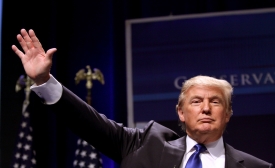After the internet mocked the picture of US President Donald Trump signing the travel ban executive order, Swedish Deputy PM and Climate Minister has taken a dig at another similar picture. Isabella Lövin posted a picture of her signing an order with a queue of female ministers standing behind her. The image is seen as a parody of the picture of President Trump signing an anti-abortion executive order with a line of male ministers standing behind him.
In November, 2016 Oxford Dictionaries proclaimed “post-truth” the word of the year. The choice was obviously a reflection of two important political campaigns: Brexit and the US Presidential elections. In both campaigns truth became subservient to political gain. The distinction between fact and fiction eroded as fake news spread globally through social media sites. However, Oxford Dictionaries’ choice was, to a certain extent, a publicity stunt in its own right.
As the new president-elect prepares to take office, traditional analysts scramble to prepare policy papers on their public diplomacy recommendations. In keeping with the twist of the Trump candidacy, it seems fitting to turn the tables and see what insights public diplomacy may glean from the Trump run. Social media, emotion, and identity are redefining traditional strategies, and Trump has exploited these shifting communication dynamics.

What can public diplomacy learn from Trump's playbook?
Taiwan’s president didn’t meet with President-elect Donald Trump during her closely watched U.S. stopover this weekend. But she did visit his favorite communication outlet. Tsai Ing-wen posted photos of her tour of Twitter Inc.’s headquarters in San Francisco on her verified account on the social-media site. It was her first tweet in more than two years, and it appeared directed to a global audience.
Tweets, of course, do not speak. They are lines, no more than 140 characters, broadcast to the world, lacking the context of a 40-page policy paper or even a full paragraph tossed off during a backyard barbecue. And the utterings of the next president often prompt a slew of questions about how they relate to policy or international diplomacy and whether they promote falsehoods or increase global instability.







